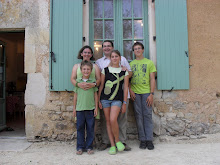On a recent long car journey to our holiday destination I suggested an easy game that all three children could play. It was called ‘Guess the Animal’. One person had to make an animal sound and the others guess what kind of animal it was. Gabriel had just visited a farm recently with the school, and learnt the names of animals in both languages. They could use either French or English when they answered. But we soon found out that all animals don’t always speak the same language…
Marc went first. ‘Scrontch-scrontch, groin groin…’ he said. The children quickly identified it as a pig. ‘How can that be!’ I said from the front seat. ‘A pig goes oink oink, like the pig called Babe in that film.’ I was quickly out-voted.
Nina was next, she cooed ‘hulluh hullah...’ and it took a while for us to guess that it was an owl, not a pigeon as I predicted. ‘No way’ the boys protest. ‘An owl says Twit-tu-whoo- tu-whooh’.
Gabriel chose a donkey, most likely inspired by Winnie-the Pooh, and said: ‘Eeyore, eeyore’. Marc and Nina guessed correctly, but disputed this hotly, arguing that a donkey usually says ‘hi-han hi-han’.
We gave up on the game, since no-one could agree on which sound was ‘right’ and ran through all the animal noises in both languages. With the help of the French storybook we had in the car about a farmyard, where the noises are written down, and my childhood memories of English animal talk we compared notes. Down on the farm some fields of French and English animals would not be able to talk to each other. Did you know, for example, that an English sheep goes ‘baa baa’ while a French sheep goes bêêêê? A duck in London would naturally say ‘quack quack!’ while its cousin in Paris says coin coin. A tiny chick would go ‘cheep cheep’ in Manchester, and piou piou in Normandy. Thankfully, cats miao, dogs woof, cows moo, and hens cluck in both countries.
Around the world there is whole orchestra of different ways of translating the same animal’s noise. For example, a male chicken, or cockerel, can ‘say’
Kho-kho-hou-hoûûû! (in Morocco)
Co-co-ri-co! (in France)
Cock-a doodle-doo! (in England)
Qui-qui-ri-qui! (in Spain)
Koké-ko-kôôô! (in Japan)
This is the kind of language use that you don’t see in a dictionary; or learn in a language school, it is often hidden in young children’s nursery songs or books. But it seems logical that a child attending pre-school or primary school would need to know the animal sounds in both languages or it could be very confusing. While this might all seem rather irrelevant in the wider scheme of helping your child become bilingual it is worth bearing in mind, especially if you plan to sing together the well-known children’s nursery rhyme ‘Old MacDonald had a Farm…’
Subscribe to:
Post Comments (Atom)



3 comments:
Gosh I never thought about the difference in the sounds that animals make, from language to language!
Great post.
I'm cracking up because I speak English and my husband Spanish and we often dispute the sounds are we try to teach of 21 month old son!
I had a French teacher in high school who made up Old Mac Donald in French. It goes something like this:
Vieux MacDo il avait une ferme
I A I A O
Et sur cette ferme il avait une vache
I A I A O
Avec un meu meu ci
Meu meu la
Ici meu la meu
Tout le monde, meu meu
Vieux MacDo....
(Note: Pronounce the 't' on avait for liaison - And the stress on the 3rd beat of that phrase is on the 'VAI' of AVAIT)
Enjoy!
Post a Comment